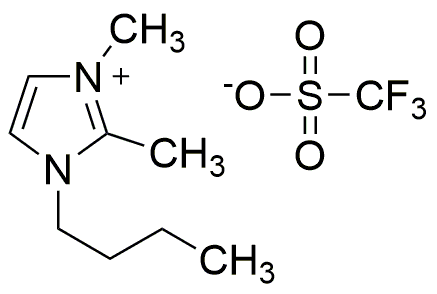1-Butyl-2,3-dimethylimidazolium trifluoromethanesulfonate is widely utilized in research focused on:
- Electrolytes for Energy Storage: This compound serves as an efficient electrolyte in lithium-ion batteries, enhancing their performance and longevity. Its ionic conductivity makes it ideal for use in energy storage systems.
- Green Solvent Applications: It is used as a green solvent in various chemical reactions, promoting environmentally friendly processes in organic synthesis. This reduces the reliance on harmful solvents, aligning with sustainable chemistry practices.
- Biochemical Research: The compound is valuable in biochemical studies, particularly in protein folding and enzyme activity assays. Its unique properties help researchers understand complex biological processes.
- Separation Processes: It is applied in the extraction and separation of valuable metals from ores, providing a more efficient and less toxic alternative to traditional methods, thus benefiting the mining industry.
- Fuel Cells: This chemical is also explored in the development of fuel cells, where it contributes to improved efficiency and stability, making it a promising candidate for clean energy technologies.
General Information
Properties
Safety and Regulations
Applications
1-Butyl-2,3-dimethylimidazolium trifluoromethanesulfonate is widely utilized in research focused on:
- Electrolytes for Energy Storage: This compound serves as an efficient electrolyte in lithium-ion batteries, enhancing their performance and longevity. Its ionic conductivity makes it ideal for use in energy storage systems.
- Green Solvent Applications: It is used as a green solvent in various chemical reactions, promoting environmentally friendly processes in organic synthesis. This reduces the reliance on harmful solvents, aligning with sustainable chemistry practices.
- Biochemical Research: The compound is valuable in biochemical studies, particularly in protein folding and enzyme activity assays. Its unique properties help researchers understand complex biological processes.
- Separation Processes: It is applied in the extraction and separation of valuable metals from ores, providing a more efficient and less toxic alternative to traditional methods, thus benefiting the mining industry.
- Fuel Cells: This chemical is also explored in the development of fuel cells, where it contributes to improved efficiency and stability, making it a promising candidate for clean energy technologies.
Documents
Safety Data Sheets (SDS)
The SDS provides comprehensive safety information on handling, storage, and disposal of the product.
Product Specification (PS)
The PS provides a comprehensive breakdown of the product’s properties, including chemical composition, physical state, purity, and storage requirements. It also details acceptable quality ranges and the product's intended applications.
Certificates of Analysis (COA)
Search for Certificates of Analysis (COA) by entering the products Lot Number. Lot and Batch Numbers can be found on a product’s label following the words ‘Lot’ or ‘Batch’.
*Catalog Number
*Lot Number
Certificates Of Origin (COO)
This COO confirms the country where the product was manufactured, and also details the materials and components used in it and whether it is derived from natural, synthetic, or other specific sources. This certificate may be required for customs, trade, and regulatory compliance.
*Catalog Number
*Lot Number
Safety Data Sheets (SDS)
The SDS provides comprehensive safety information on handling, storage, and disposal of the product.
DownloadProduct Specification (PS)
The PS provides a comprehensive breakdown of the product’s properties, including chemical composition, physical state, purity, and storage requirements. It also details acceptable quality ranges and the product's intended applications.
DownloadCertificates of Analysis (COA)
Search for Certificates of Analysis (COA) by entering the products Lot Number. Lot and Batch Numbers can be found on a product’s label following the words ‘Lot’ or ‘Batch’.
*Catalog Number
*Lot Number
Certificates Of Origin (COO)
This COO confirms the country where the product was manufactured, and also details the materials and components used in it and whether it is derived from natural, synthetic, or other specific sources. This certificate may be required for customs, trade, and regulatory compliance.


